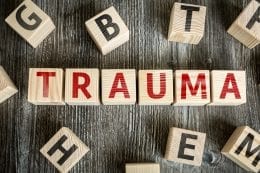 Trauma can come in all forms; from witnessing a brutal murder or having experienced abuse first handedly to being involved in war, a natural disaster or even a traumatic medical complication; traumatic experiences can create a sense of turmoil and isolation in individuals, affecting them in many ways. After experiencing a traumatic event most individuals will experience avoidance, as they try to forget and disassociate themselves with anything related to the initial event. This can create lost friendships and relationships, poor job performance, social withdrawal, and potentially self-destructive behavior. Studies have shown that individuals who have experienced trauma are more likely to engage in eating disorders such as bulimia nervosa, binge eating disorder, and anorexia nervosa. In addition, the earlier the trauma occurs, the more intense the outcome. This is due to the state of the individual’s brain organization and development.
Trauma can come in all forms; from witnessing a brutal murder or having experienced abuse first handedly to being involved in war, a natural disaster or even a traumatic medical complication; traumatic experiences can create a sense of turmoil and isolation in individuals, affecting them in many ways. After experiencing a traumatic event most individuals will experience avoidance, as they try to forget and disassociate themselves with anything related to the initial event. This can create lost friendships and relationships, poor job performance, social withdrawal, and potentially self-destructive behavior. Studies have shown that individuals who have experienced trauma are more likely to engage in eating disorders such as bulimia nervosa, binge eating disorder, and anorexia nervosa. In addition, the earlier the trauma occurs, the more intense the outcome. This is due to the state of the individual’s brain organization and development.
Statistics on eating disorders and trauma
Eating disorders are not entirely about food but rather a way to control that specific aspect in an individual’s life. An individual may feel out of control or powerless after experiencing a traumatic event and as a result, they use restricting or binging behaviors to control that aspect of their life in order to hide their feelings of shame, hopelessness and fear. Other self-destructive behaviors that are used to self-medicate after a traumatic event is non-suicidal self-injury, which includes cutting and other forms of self-mutilation in order to release feelings of guilt and anger. Eating disorders like other self-destructive behaviors are ways to maintain control while distancing oneself from the pain. Others may not even realize their loved one is strongly affected by the traumatic event because they are able to bury their emotions through their eating habits to the point the individual may completely forget why their eating disorder began in the first place.
The link between PTSD and eating disorders
Post-traumatic stress disorder is a very specific disorder related to trauma and recent studies have examined the correlation with this diagnosis and eating disorders. According to studies, approximately 75 percent of women who have enrolled in residential treatment for their eating disorder admit to experiencing some form of trauma while 50 percent of these women have a history of PTSD. Additionally, studies have also shown a strong correlation between binge eating and PTSD.
Treatment for eating disorders and trauma
Eating disorders are often connected to the experience of trauma, often because the behaviors associated with these diseases develop as a coping mechanism or means of self-protection. Many individuals who have suffered some form of trauma may engage in an eating disorder as a means of escaping the related emotions or reducing awareness of what they might have experienced. Treatment is therefore focused on uncovering the emotions associated with the traumatic event through therapy approaches such as dialectal behavioral therapy (DBT). Process groups have also been deemed helpful in treating trauma and eating disorders because individuals are able to answer the “how” and “why”. Experiential therapies such as art therapy and animal therapy allow individuals to express and release emotions in a soothing environment. Once the underlying trauma and the associated emotions are addressed, treatment for the eating disorder can begin. Many eating disorder programs offer a trauma treatment track where they have therapists who specialize in trauma and how to uncover emotions associated with traumatic events in order to fully understand and treat the eating disorder at hand.
Related Links:
Treating Trauma: Exposure Therapy vs EMDR
